
As the Muslim consumer Halal food market grows, there is a need to better understand the terms used to describe the services, needs, and practices of this group of consumers. By understanding these concepts, terms, and definitions, stakeholders will be able to better navigate the segment. Getting a better understanding of the word “Halal” is the first step.
The definition of Halal (حلال)
Halal means permissible in Arabic. It means permissible according to Islamic rules. Most commonly, it refers to food, but it can refer to any action permitted by Islam. Haram or non-Halal is the opposite of Halal. In Islamic teachings, anything considered unlawful is prohibited. Often used in reference to food, it can also refer to other illegal acts in Islam such as stealing, corruption, etc.

How do you define Halal food?
Halal food refers to all food that is permissible to eat according to Islamic teachings. The term refers to any food that is not classified as Haram (or forbidden). Halal foods and beverages are those that are not explicitly forbidden in the Quran. Worldwide, Muslims consider the Quran to be God’s final revelation and the book of perfect direction and bearing for humanity.
According to the Quran, God says:
-
“Eat all of the good things which We have provided for you.” (Quran 2:172)
-
“Eat of what is lawful (Halal) and wholesome (Tayyib) on earth.” (Quran 2:168)
-
“O mankind, eat whatever is on earth [that is] lawful and good and do not follow the footsteps of Satan. Indeed, he is to you a clear enemy.” (Quran 2:168)
Even though some specific teachings vary, food and drinks must be free of pork, alcohol/intoxicants, poisons, harmful ingredients, or unhygienic elements. According to Islamic law, meat must be slaughtered by the Zabihah method.
How can Muslim-friendly food or Halal-friendly food be defined?
Some restaurants use these terms to indicate that their food is suitable for Muslims. Muslims, however, require a higher level of assurance than these terms convey. Food must either be Halal (permissible for consumption) or not Halal (not permissible for consumption). Permissible-friendly cannot be achieved.
Why is Mashbooh important?
Mashbooh means suspicious or doubtful in Arabic. It is a Mashbooh if it cannot be determined whether a food item is Halal or Haram.
The meaning of Zabihah is: What is it?
An Islamic method of slaughtering an animal. According to Muslims, this is the most humane and purest way to slaughter an animal.
Halal & Tayyib Food: What are they?
Good/clean/wholesome is the literal translation of Tayyib. Muslim food is often of a higher quality or purity, such as organic or simply healthy. Additionally, it incorporates universal concerns such as being natural, eco-friendly, eco-ethical, not cruel to animals, and reducing overconsumption. Thus, Halal (food made with permissible ingredients) can be Halal but not Tayyib.
Halal meat: what is it?
Although there are minor differences of opinion within Islamic law about which animals are Halal, the general consensus is that all seafood and herbivorous land animals are Halal if slaughtered according to Islamic Zabihah laws.
In Islam, what foods are Haram or non-Halal?
There are only a few foods and beverages that are explicitly forbidden in the Quran, as listed below:
-
Intoxicants such as alcohol and narcotics
-
Non-slaughtered dead animals
-
The blood
-
The pork
-
Idol-slaughtered meat
-
Such as lions and tigers, all carnivores have teeth
-
Birds of prey, hawks, vultures, falcons, and all winged creatures with claws
-
Donkeys, mice, scorpions, snakes, and frogs that have been domesticated
-
When an animal has died before being slaughtered according to Islamic law (except fish and sea creatures)
Halal food and drinks must meet certain conditions.
Halal food or drink must also meet the following criteria:
-
According to shariah law, it does not contain anything that is haram.
-
There was nothing haram in its preparation, processing, or contamination
-
It was not prepared, processed, transported, or stored in a haram facility.
-
According to Shariah law, it does not contain najis (unclean) material
-
Food must be safe for human consumption, non-poisonous, non-intoxicating, or non-hazardous.
-
Shariah prohibits its preparation, processing, or manufacturing on equipment contaminated with najis or haram foods
-
According to Islamic rites, the meat(s) must be slaughtered
